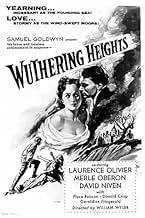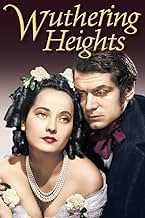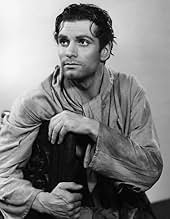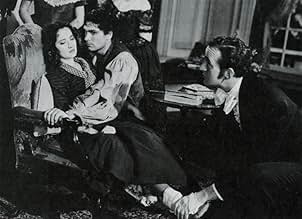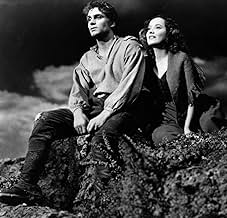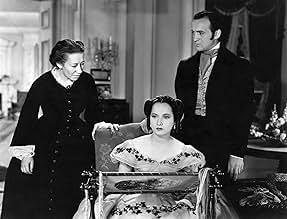CALIFICACIÓN DE IMDb
7.5/10
21 k
TU CALIFICACIÓN
Un criado en la casa de Cumbres Borrascosas le cuenta a un viajero la desafortunada historia de los amantes Cathy y Heathcliff.Un criado en la casa de Cumbres Borrascosas le cuenta a un viajero la desafortunada historia de los amantes Cathy y Heathcliff.Un criado en la casa de Cumbres Borrascosas le cuenta a un viajero la desafortunada historia de los amantes Cathy y Heathcliff.
- Dirección
- Guionistas
- Elenco
- Ganó 1 premio Óscar
- 9 premios ganados y 7 nominaciones en total
Sarita Wooton
- Cathy (as a child)
- (as Sarita Wooten)
Frank Benson
- Heathcliff Servant
- (sin créditos)
Romaine Callender
- Robert
- (sin créditos)
Richard Clucas
- Little Boy
- (sin créditos)
Vernon Downing
- Giles
- (sin créditos)
Opiniones destacadas
Being a classic film buff, I had the chance of being introduced to this film by chance one late evening when it was being aired on TCM. I fell in love with the movie, and when I was told that it would be required reading over the summer, I was ridiculously happy. As many have noted, the 1939 adaptation of "Wuthering Heights" is, more or less, merely the first volume of Emily Bronte's beautifully and powerfully written classic -- focusing less on the detail of Heathcliff's wrath post Cathy's death, but moreso on the sheer complexity of Heathcliff and Cathy's relationship (the scenes at Penniston Crag of them among the moors and heather are not in the book because Bronte had to stick to Ellen's point of view -- it was nice that we could finally have an in-depth look at the tumultuous relationship between Cathy and Heathcliff). While characters are omitted (Frances, Hareton, Linton and the baby Catherine), it still retains much of the very nature of the novel. (If you will recall, many parts of "Gone With The Wind" were changed and characters removed in the process of transferring Margaret Mitchell's masterpiece into a screen epic. After all, this is Hollywood.)
The cinematography is divine (very much worth its Oscar), perfectly capturing the very essence of the bleak, chilling, haunting Yorkshire Moors that Bronte described in her book. Laurence Olivier is, in my opinion, a very fine Heathcliff. Indeed, in the book his nature is more animalistic and devilish, but Olivier superbly exhibits what Heathcliff is all about -- dark, brooding, and terribly bitter. Even at our first introduction to him, we know by the tone of his voice that something is very, very wrong with this man and that something is very, very off in that household. Olivier expresses Heathcliff's wildness and devilishness through his voice, stance and through his facial gestures, rather than so much in other physical ways. Merle Oberon is remarkable as Cathy -- a much more dark and exoctic beauty than Isabella whose good looks are very wholesome and pure (perhaps to match the darkness of the gypsy stable-boy Heathcliff), and capturing the duality of personality that is Catherine Earnshaw -- part of her wanting to love a wild, evil, wicked stable boy... the other part longing to be part of a higher society. Particularly coming to mind is her scene in the kitchen with Ellen and that marvelously disturbing death scene -- her eyes wild. (I do wish they would have left in the part of the book where she refuses to eat and begins hallucinating -- Oberon could have performed it so well.) Also to be noted are the stunning performances of David Niven and Gerladine Fitzgerald as the long-suffering Edgar and Isabella Linton (respectively), their lives made miserable by Cathy's selfishness, vanity and greed to be part of a higher way of living, and by Heathcliff's undying love for Catherine and his course of revenge and destruction. Flora Robson is also wonderful as Ellen Dean, narrator of the whole sordid story.
Someone mentioned that this film (by focusing on the love story and by the ending, I suppose) tried to say that Heathcliff and Catherine were perfect for each other and could have, eventually, found true love. I disagree, wholeheartedly. I believe what director William Wyler was trying to say here was that Heathcliff and Catherine were not good people. Cathy was right when she said that she and Heathcliff's souls were made of the same basic fiber -- they were both greedy and selfish (he wanted her passion for him to be as deep as his passion for her and she wanted and if he couldn't have it, no one else deserved to have it, and God forbid those around him feel any kind of love, compassion or humanity; and she didn't even really know what she wanted, except to be part of the upper crust and to rise above what she had lived through when Hindley became master of their house) and because of that, their love could have never meant anything BUT tragedy. They could never have found happiness together because they were not happy people. But they could find love in death -- because in death, they could be what they really were all along -- children; mere children forced to grow up all too quickly with the death of the man who cared deeply for them, thus forcing Hindley to become head of the household. There would be no Hindley in death. And as children they were good together -- as children, Cathy, wicked as she was at times as a youngster, could restore hopes of prosperity to Heathcliff's dark, bitter soul. They were, as children, more or less all one another had. And so they could go on, as children, without a care, happily picking heather and being King and Queen on the moors.
You've GOT to see this movie.
The cinematography is divine (very much worth its Oscar), perfectly capturing the very essence of the bleak, chilling, haunting Yorkshire Moors that Bronte described in her book. Laurence Olivier is, in my opinion, a very fine Heathcliff. Indeed, in the book his nature is more animalistic and devilish, but Olivier superbly exhibits what Heathcliff is all about -- dark, brooding, and terribly bitter. Even at our first introduction to him, we know by the tone of his voice that something is very, very wrong with this man and that something is very, very off in that household. Olivier expresses Heathcliff's wildness and devilishness through his voice, stance and through his facial gestures, rather than so much in other physical ways. Merle Oberon is remarkable as Cathy -- a much more dark and exoctic beauty than Isabella whose good looks are very wholesome and pure (perhaps to match the darkness of the gypsy stable-boy Heathcliff), and capturing the duality of personality that is Catherine Earnshaw -- part of her wanting to love a wild, evil, wicked stable boy... the other part longing to be part of a higher society. Particularly coming to mind is her scene in the kitchen with Ellen and that marvelously disturbing death scene -- her eyes wild. (I do wish they would have left in the part of the book where she refuses to eat and begins hallucinating -- Oberon could have performed it so well.) Also to be noted are the stunning performances of David Niven and Gerladine Fitzgerald as the long-suffering Edgar and Isabella Linton (respectively), their lives made miserable by Cathy's selfishness, vanity and greed to be part of a higher way of living, and by Heathcliff's undying love for Catherine and his course of revenge and destruction. Flora Robson is also wonderful as Ellen Dean, narrator of the whole sordid story.
Someone mentioned that this film (by focusing on the love story and by the ending, I suppose) tried to say that Heathcliff and Catherine were perfect for each other and could have, eventually, found true love. I disagree, wholeheartedly. I believe what director William Wyler was trying to say here was that Heathcliff and Catherine were not good people. Cathy was right when she said that she and Heathcliff's souls were made of the same basic fiber -- they were both greedy and selfish (he wanted her passion for him to be as deep as his passion for her and she wanted and if he couldn't have it, no one else deserved to have it, and God forbid those around him feel any kind of love, compassion or humanity; and she didn't even really know what she wanted, except to be part of the upper crust and to rise above what she had lived through when Hindley became master of their house) and because of that, their love could have never meant anything BUT tragedy. They could never have found happiness together because they were not happy people. But they could find love in death -- because in death, they could be what they really were all along -- children; mere children forced to grow up all too quickly with the death of the man who cared deeply for them, thus forcing Hindley to become head of the household. There would be no Hindley in death. And as children they were good together -- as children, Cathy, wicked as she was at times as a youngster, could restore hopes of prosperity to Heathcliff's dark, bitter soul. They were, as children, more or less all one another had. And so they could go on, as children, without a care, happily picking heather and being King and Queen on the moors.
You've GOT to see this movie.
One of the finest romantic films ever filmed, this 1939 Samuel Goldwyn production rates with many - including myself - as being the most beloved version of Emily Bronte's haunting novel. Although it stops at chapter seventeen and the ending is seen as a bit trite by some, it's a brilliantly enacted, finely mounted production with beautiful photography and authentic period detail set-wise. Merle Oberon is well-cast as the selfish, vain and rather shallow Cathy. What makes her character so intriguing and interesting is that no matter what happens to her materially, she has an undying love for the gypsy-blooded heathen named Heathcliff. Laurence Olivier, never a great success in films prior to this, gives a brutally honest account of everything Bronte's Heathcliff should be: proud, bold, vengeful & darkly brooding -a tortured soul in general. Wyler's guiding hand is patent throughout: it was Olivier himself who gave credit to the meticulous director in teaching him the particular ropes of screen acting: it shows! Lady-like Isabella is well-played by the Irish Geraldine Page, while Ellen, the long-suffering servant is played sympathetically by the fine character actress Flora Robson. David Niven, ideally cast as the milquetoasty Edgar Linton, actually had a clause in his contract which freed him from having to do crying scenes! A timeless masterpiece of the "haunting" love story genre, this was Goldwyn's personal favourite of all his films.
Great literature enriches the soul. The Brontes created great literature because they invented so much of what it means. They invented ways of observing the soul that hadn't already been mined by Shakespeare. If you want a great film that celebrates, explores, exploits Bronte, you can't escape the reality that you'd have to stretch film the same way Charlotte stretched perspective.
Didn't happen here. Olivier seemed good enough at what he knew (stage acting) but that isn't bendable to great experiences in film. Never was.
But you might want to watch this for another reason. The dialog and acting are ordinarily conceived. But the cinematography is extraordinary, from the very special Greg Toland. Greg DID stretch cinema in the way we mentioned. His greys have depth. When he photographs the heath, we feel the atmosphere as if the mist had emotion.
The interiors of the house are magnificent in design. And Toland's lighting and framing are so haunting.
This film is why Orson Welles wanted him on "Citizen Kane." You need to watch it to see where much of the disembodied ghost-observer comes from. With Toland, Cathy defines what we see and how.
But the actual story? Go read it instead.
Ted's Evaluation -- 2 of 3: Has some interesting elements.
Didn't happen here. Olivier seemed good enough at what he knew (stage acting) but that isn't bendable to great experiences in film. Never was.
But you might want to watch this for another reason. The dialog and acting are ordinarily conceived. But the cinematography is extraordinary, from the very special Greg Toland. Greg DID stretch cinema in the way we mentioned. His greys have depth. When he photographs the heath, we feel the atmosphere as if the mist had emotion.
The interiors of the house are magnificent in design. And Toland's lighting and framing are so haunting.
This film is why Orson Welles wanted him on "Citizen Kane." You need to watch it to see where much of the disembodied ghost-observer comes from. With Toland, Cathy defines what we see and how.
But the actual story? Go read it instead.
Ted's Evaluation -- 2 of 3: Has some interesting elements.
I have not read the Emily Bronte novel on which this film is based so obviously I cannot comment on the effectiveness of it as an adaptation (I understand that almost the entire second half of the book was excised). However, I thoroughly enjoyed the film. Oberon and especially Olivier, one of my favorites, are very convincing and moving as the doomed lovers Cathy and Heathcliff (according to my friend, Heathcliff is written as being much more likeable in the film than in the book). The supporting cast was also very good. Wuthering Heights just deals very poignantly with the effect that birth and status have on people's lives. Yet another winner from Wyler. My score 9/10.
Director William Wyler and star Laurence Olivier bring to life the atmosphere and most important characters of a classic novel in "Wuthering Heights". While necessarily omitting much of the material for cinematic purposes, and having a slightly different emphasis, the film version will still be appreciated by those who enjoy classic stories.
The Emily Brontë novel on which the film is based is one of the greatest books of its kind. It is far deeper than any film version could be, so for this movie only a portion of the story is used, and several characters are omitted. The movie also has more of a melodramatic feel than did the novel. It does retain the flashback-style of narrative, which works just as well in the film as it did in the book.
The story opens with a weary traveler meeting up with a now-aging, hostile, and excitable Heathcliff (Olivier), after the main action of the story is in the past. Unsettled by this strange man, the traveler is told Heathcliff's story by the housekeeper Ellen (Flora Robson). This begins with Heathcliff's childhood, and goes through his relations with the Earnshaw family and the Linton family. The heart of the story is his troubled romance with Catherine Earnshaw (Merle Oberon), whom he has known since being taken in by her family as a child. This relationship in turn leads to conflicts with most of the other characters, and affects the lives of everyone involved in profound ways.
Olivier memorably portrays this difficult character, and helps the audience feel his longing and restlessness. Oberon is also ideal as Catherine - a mercurial character who is both a complement and a contrast to Heathcliff. The other main strength of the film is its realization of the main settings, which are almost as important to the story as the characters are: once-fine but now gloomy and declining Wuthering Heights; the pleasant but vapid Thrushcross Grange, home of the Linton family; and especially the wild, mysterious Yorkshire moors, the only place where Heathcliff and Cathy are ever really happy. These settings are all effectively created and photographed, and provide an appropriate background to the events and tensions in the characters' lives.
The result is a movie that, while lacking the complexity of the novel, is a satisfying realization of the most important aspects of the book, and which effectively brings the audience into the lives and hearts of the characters.
The Emily Brontë novel on which the film is based is one of the greatest books of its kind. It is far deeper than any film version could be, so for this movie only a portion of the story is used, and several characters are omitted. The movie also has more of a melodramatic feel than did the novel. It does retain the flashback-style of narrative, which works just as well in the film as it did in the book.
The story opens with a weary traveler meeting up with a now-aging, hostile, and excitable Heathcliff (Olivier), after the main action of the story is in the past. Unsettled by this strange man, the traveler is told Heathcliff's story by the housekeeper Ellen (Flora Robson). This begins with Heathcliff's childhood, and goes through his relations with the Earnshaw family and the Linton family. The heart of the story is his troubled romance with Catherine Earnshaw (Merle Oberon), whom he has known since being taken in by her family as a child. This relationship in turn leads to conflicts with most of the other characters, and affects the lives of everyone involved in profound ways.
Olivier memorably portrays this difficult character, and helps the audience feel his longing and restlessness. Oberon is also ideal as Catherine - a mercurial character who is both a complement and a contrast to Heathcliff. The other main strength of the film is its realization of the main settings, which are almost as important to the story as the characters are: once-fine but now gloomy and declining Wuthering Heights; the pleasant but vapid Thrushcross Grange, home of the Linton family; and especially the wild, mysterious Yorkshire moors, the only place where Heathcliff and Cathy are ever really happy. These settings are all effectively created and photographed, and provide an appropriate background to the events and tensions in the characters' lives.
The result is a movie that, while lacking the complexity of the novel, is a satisfying realization of the most important aspects of the book, and which effectively brings the audience into the lives and hearts of the characters.
¿Sabías que…?
- TriviaLaurence Olivier found himself becoming increasingly annoyed with director William Wyler's exhausting style of filmmaking. After yet another take, he is said to have exclaimed, "For God's sake, I did it sitting down. I did it with a smile. I did it with a smirk. I did it scratching my ear. I did it with my back to the camera. How do you want me to do it?" Wyler's retort was, "I want it better." However, Olivier later said these multiple takes helped him learn to succeed as a movie actor.
- ErroresThough the social situations, and even the soundtrack, are consistent with the novel's timeframe of 1770-1801, the Colonial/Napoleonic era, the costumes are an odd mix of mid-Victorian and American Civil War.
- Citas
Heathcliff: Catherine Earnshaw, may you not rest so long as I live on! I killed you. Haunt me, then! Haunt your murderer! I know that ghosts have wandered on the Earth. Be with me always. Take any form, drive me mad, only do not leave me in this dark alone where I cannot find you. I cannot live without my life! I cannot die without my soul.
- Créditos curiososOpening credits prologue: On the barren Yorkshire moors in England, a hundred years ago, stood a house as bleak and desolate as the wastes around it. Only a stranger lost in a storm would have dared to knock at the door of Wuthering Heights.
- Versiones alternativasThere is an Italian edition of this film on DVD, distributed by DNA Srl: "CIME TEMPESTOSE (1939) + ORGOGLIO E PREGIUDIZIO (1940)" (2 Films on a single DVD), re-edited with the contribution of film historian Riccardo Cusin. This version is also available for streaming on some platforms.
- ConexionesFeatured in AFI Life Achievement Award: A Tribute to William Wyler (1976)
- Bandas sonorasPiano Sonata in A major, K.331: Rondo alla Turca
(1778) (uncredited)
Music by Wolfgang Amadeus Mozart
Played by Alice Ehlers on harpsichord
Selecciones populares
Inicia sesión para calificar y agrega a la lista de videos para obtener recomendaciones personalizadas
Detalles
- Fecha de lanzamiento
- País de origen
- Sitio oficial
- Idioma
- También se conoce como
- Wuthering Heights
- Locaciones de filmación
- Productora
- Ver más créditos de la compañía en IMDbPro
Taquilla
- Total en EE. UU. y Canadá
- USD 624,643
- Fin de semana de estreno en EE. UU. y Canadá
- USD 15,493
- 9 abr 1989
- Total a nivel mundial
- USD 624,643
- Tiempo de ejecución
- 1h 44min(104 min)
- Color
- Relación de aspecto
- 1.37 : 1
Contribuir a esta página
Sugiere una edición o agrega el contenido que falta


